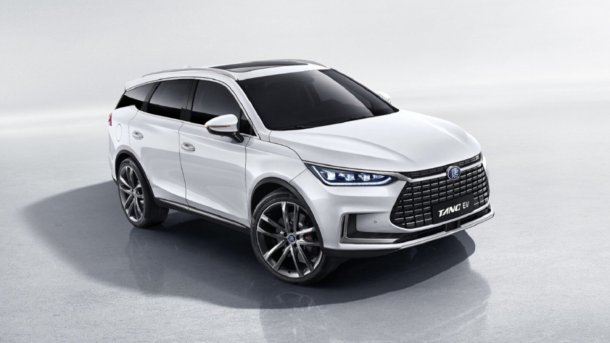Chinese car manufacturer BYD: In the fast lane
The Build Your Dream (BYD) brand is a Chinese flagship company that has left Tesla behind and is now aiming for Europe.

BYD is the largest manufacturer of electrified cars in China. By a large margin. The Tang SUV is also available in Europe.
(Bild: BYD)
- Christian Domke Seidel
(Hier finden Sie die deutsche Version des Beitrags)
Episode four of a ten-part series in which heise/Autos looks at the Chinese car market. There, Chinese electric car producers - some of them strongly supported by the so-called Communist Party - are just warming up in order to soon roll up the domestic and international markets with a lot of momentum and a colorful bouquet of state-of-the-art cars. This is likely to have consequences for German car manufacturers, whose largest single global market has been China for several years.
On the one hand, this will foreseeably change the picture on German and European roads, but it will also have repercussions for German producers and their sales in China, the world's largest single market.
Addressing Chinese competitor Build Your Dreams (BYD), Elon Musk spoke into a Bloomberg reporter's microphone, "Have you seen their cars? I don't think they have a good product." Eleven years later, BYD has sold more electric cars than major competitor and pioneer Tesla. And Musk is buying his batteries from BYD. How did that happen?
Start with cell phone batteries and MP3 players
BYD is a company to the taste of the Communist Party. It could hardly be more Chinese. In 1995, Wang Chuanfu, founder and CEO of the brand, began building cell phone batteries and MP3 players. This was followed in 2003 by the takeover of an ailing car company and the construction of electric cars. In the first half of 2022, BYD sold a total of 641,350 so-called "new energy vehicles" in China. This includes hybrid models. Tesla only 564,740 units.
However, some of these are also for export. This is why BYD - if only new registrations of electric vehicles between January and August 2022 are taken into account - has a market share of 29 percent. In second place comes SAIC-GM-Wuling with 9.6 percent. Tesla only comes in third place with 7 percent.
From battery manufacturer to car producer
BYD does two things differently than its competitors. First, the company has an enormously broad product range. In addition to passenger cars, there are buses, trucks, electric bicycles and forklifts. Second, Wang Chuanfu has set up his company like Henry Ford did a hundred years ago: Instead of relying on outsourcing, BYD produces all the central elements along the value chain itself.
(Bild: BYD)
With the start of car production, BYD did not stop or sell the production of battery cells, but expanded it. In the meantime, its group is one of the largest manufacturers of batteries for electric cars in the world. However, the brand needs lithium for this (the batteries do not require cobalt), which is why BYD also owns mines and mining rights in South America and Africa.
The required semiconductors come from the subsidiary BYD Semiconductor. When global supply chains crumbled during the extensive lockdowns in China, BYD even gained market share. BYD is the only producer in China that also has its own factory for recycling used vehicle batteries. A Communist Party law requires automakers to collect the batteries again. For some brands, this may be a nuisance, but for BYD it is a line of business.
A brand to the taste of the Communist Party
The Communist Party also holds the company in high regard. It exemplifies the party's plan to strengthen the domestic economy. Under the concept of "dual circulation," the government wants to strengthen domestic trade and rely on the financial resources of its 1.4 billion inhabitants. Accordingly, there are protectionist laws. These are regularly relaxed - for example, the joint venture obligation for foreign car manufacturers fell - but of course brands like BYD profit enormously from this. Wang Chuanfu thanks them with masks. His group now produces five million medical mouth coverings a day. That, too, should not be to his detriment.
(Bild: BYD)
The Communist Party's industrial strategy sets yet another target. The leading manufacturers of electric cars are to sell at least ten percent of their production abroad from 2025. BYD is also taking great strides toward Europe for this reason. To this end, the brand is cooperating with the Hedin dealer group. It is currently represented in Sweden (104 dealers), Belgium (20), Norway (17) and with four branches in Switzerland. There is even a branch in Germany. New dealers are currently being recruited at full speed. Originally, Wang Chuanfu's plan was to have risen to become the world's largest car manufacturer by 2025. With BYD, he does not want to overtake Tesla in China, but Toyota around the world. It's a goal that dates back to 2011. It was the same year that Elon Musk ranted about BYD.
(fpi)